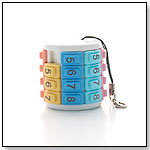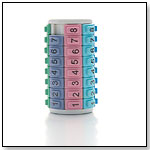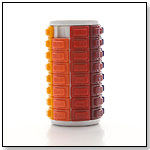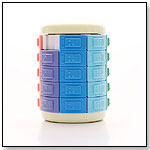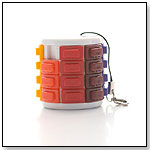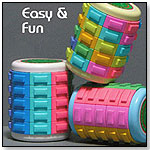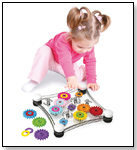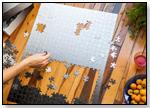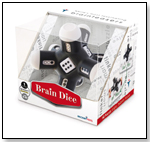|
|
Interview with Tom Sebazco from ENI PUZZLE Puzzling Together a Business is Harder Than it SeemsIn a market saturated with electronics and flashy licensed toys, it can be hard for a specialty toy company to get their products on store shelves. Below, Tom Sebazco from ENI PUZZLE told TDmonthly about the struggles his company has faced, how they've gotten this far, and what makes their specialty puzzle different from others on the market. 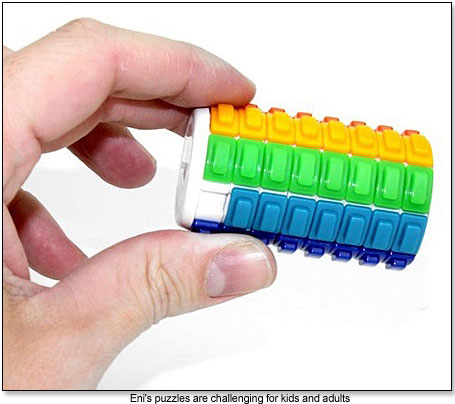 Q. What career path did you originally envision for yourself? A. As a painter/sculptor, where I still spend time at a job painting murals and sculpting, after graduating from Pratt Institute. Q. Did you ever anticipate working with children's products? A. After watching Willy Wonka with Gene Wilder: for about 10 minutes...other than that: Never Q. How did your company come up with the idea for your first product? A. My father-in-law (retired architect) and brother-in-law (PhD Purdue University Aeronamic Astrodynamic Engineering [Rocket Scientist]) wanted to make a toy for my nephew (Eddie) that would teach him basic mathematical fundamentals; so the brother and father discussed and the father-in-law carved one out of wood... five years later we had a family business. Q. How long did it take to go from the original spark of an idea to actual production? A. 5 Years Q. How much money did you need to create the first prototype and come up with a business plan? A. However much we had on our credit cards. We operate as much as possible on a cash basis, not wanting to accumulate a lot of debt. We don't spend it unless we have it, although my father-in-law did take out an undisclosed sum from his building in Seoul (He operates independently under international Korean Laws as Eni Puzzle Land Co). A. We had some money saved, credit cards for invoicing/shipping and I still receive money from the artist job, while JeeSoo has some money from his Rocket Scientist job, etc. Q. What aspect of the toy industry most surprised you when you first started? A. Actually, how much of it is in Chinese manufacturing. That wasn’t necessarily a surprise; but a "jolt." We are doing our best to have a “Made in the USA” label ourselves, and we are really diligently searching for a US Factory. Q. What were the top two or three best pieces of advice you received, and from whom? A. Don’t spend what you do not have - My father the accountant Hear everyone, but listen to those you respect - advice from Seymor Leichman, professor at Pratt, on how to handle critique from all directions Q. The worst pieces of advice? A. “You should put that puzzle in a clamshell over-sized package so I don’t have to worry about theft at my store” (we ignored this to stay green and also keep the wholesale prices down for retailers’ own good) Q. What were the top two or three most significant obstacles you had to overcome to achieve success and how did you do it? A. Cash, Capital, and more Cash! We would be doing a lot more with the marketing and packaging aspects, but we do not want the burden of debt in these economic times Q. Where did you grow up? A. All over the US; Primarily Philadelphia area, Ottumwa, Iowa, and DFW, Texas Q. Where and what did you study? A. Philosophy & Art (painting, sculpture, drawing) and Advertising (BFA Communication Design Advertising Art Direction; Pratt Institute) Q. What hardships did you have to overcome during your formative years and how did they help you persevere as a business owner? A. A lot of moving as my father kept getting better job opportunities. That led me to become really adaptable and a I developed a willingness to reinvent myself as needed. Having the perspective of many different American cultures was great, as it helped me avoid tunnel vision. Q. What is the most disappointing thing that you have to live with in business? A. There just is never enough cash for anyone to jump on every opportunity, us included. That is frustrating...but we are a little wiser with how we spend our money because of this. We keep things at a calm rate of growth which is what we really need as we learn the business – it’s a disadvantage that we are making an advantage. Q. If you had to start over, what would you do differently? A. I would have communicated better within the company to avoid errors that were unnecessary. But, it is those errors that gave us that gave us our greatest wisdom. My father-in-law’s ambition that made everything possible also needs to be tempered at times; but, if that is what makes this possible - how to you temper it? Q. How do you hope your product/s will affect children's lives? A. The whole idea is to put non-electronic, educational toys in the hands of children to establish hand-eye coordination, strengthen creativity, and build basic mathematic fundamentals. We want to get them away from the flashy gadgets and keyboards and just have them lose themselves in their wonderment and curiosity in a way that stimulates their development in areas that are being ignored. 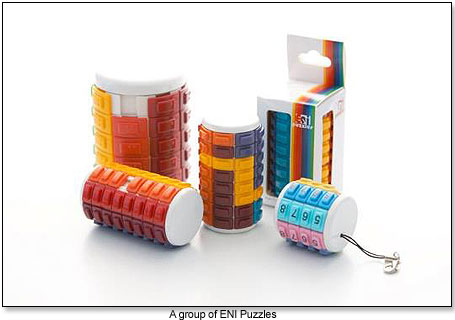 Q. Where do you think the industry is headed? A. China and Mexico then India…We need to get away from the discount mentality and focus on quality and technology. I can’t wait to see what a Lego set looks like in 50 years, with a proper mentality. The Interactive Wii type game where the game controller isn't even hand held on a 3-D screen could be right around the corner. This will also create a large space for the non-electronic games, too, which is where we fit in. Q. What one unique quality makes your product better than your competition? A. At the moment, we are so unique that there is no competition. We need to make retailers understand, as well as the public, that as a 3-D puzzle we offer a multitude of solutions and a real puzzle that, unlike all other similar products, is not based on an algorithm. It’s a pure problem-solving puzzle, kind of like a 3-D Sudoku or a traditional jigsaw puzzle. We are small and compact enough to travel with, and are a perfect "figit" toy to kill time in mundane situations. We haven't found a non-electronic item on the market like us. Q. What one piece of advice would you offer to someone just starting out in the toy industry? A. Don’t rush into bad design and bad packaging. Don’t accumulate so much debt that you cannot afford to effectively market yourselves and fix fundamental flaws that will inevitably exist in your original designs. Still craving more puzzles? Then check out our interview with Ravensburger, or check out our Toys To Talk About - Puzzles and Top-10 Most-Wanted Puzzles!
 Writer's Bio: Justina Huddleston graduated Magna Cum Laude from Emerson College with a BA in Writing, Literature, and Publishing in 2009. After graduating she was the on-site director of the Boston Children's Museum gift store for a year, selling educational, developmental, and creative activity toys that tied in with the museum's exhibits. Justina also interned at children's book publisher Candlewick Press before moving from Boston to Los Angeles, where she is now Editorial Director of TDmonthly Magazine. Read more articles by this author Writer's Bio: Justina Huddleston graduated Magna Cum Laude from Emerson College with a BA in Writing, Literature, and Publishing in 2009. After graduating she was the on-site director of the Boston Children's Museum gift store for a year, selling educational, developmental, and creative activity toys that tied in with the museum's exhibits. Justina also interned at children's book publisher Candlewick Press before moving from Boston to Los Angeles, where she is now Editorial Director of TDmonthly Magazine. Read more articles by this author |
| ||||||||||||||||||||||||||||||||||||||||||||||||||||||||||||||
Disclaimer Privacy Policy Career Opportunities
Use of this site constitutes acceptance of our Terms of Use.
© Copyright 2025 PlayZak®, a division of ToyDirectory.com®, Inc.

